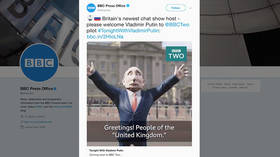Who’s afraid of Huawei? Why Google’s ‘fatal blow’ may actually be a sign of desperation
Are the consequences of Google complying with the US' Huawei ban as serious as they are made out to be? While some claim the move spells the end of the Chinese tech giant, they say they have only begun to fight.
Looking at the coverage following Google's bombshell decision to suspend one of Android's largest distributors, one would get the impression that things are very bleak indeed.
Huawei users after the ban pic.twitter.com/QgRxwEdu0P
— eternal classic (@etrnl_classic) May 21, 2019
Whereas just last month Huawei surpassed Apple to become the world's second largest cell phone vendor, just as the company began working around the world to install history changing 5G technology, suddenly the company's entire future is being declared "uncertain."
While some are even claiming Google's blow might be "fatal," the rumors of Huawei's death have likely been grossly exaggerated.
For instance, the concrete effects the ban will have on users are perhaps not quite as serious as portrayed. Phones already operating with the Google services will continue to be able to use them, they will even be able to continue to update the apps. Google Play Protect which identifies and removes malware, will also continue to function. These apps will work up to and including the current generation P30 devices.
For Huawei users' questions regarding our steps to comply w/ the recent US government actions: We assure you while we are complying with all US gov't requirements, services like Google Play & security from Google Play Protect will keep functioning on your existing Huawei device.
— Android (@Android) May 20, 2019
That is not to say that the move isn't serious. The Huawei Mate 30, slated for October release, will be the first affected by the ban, losing access to Google mobile services like YouTube, Google Maps and Chrome. The phones will still have access to the open source version of Android software, but that would mean a potentially year long lag on OS updates, and without the expectant bells and whistles of Google services.
That is, if Huawei decides it wants to keep running with the exclusive services… all signs seem to indicate that they will instead chose to create their own. Huawei's consumer division head Richard Yu says their own OS, with Android app compatibility, has already been in development since 2012, and could be ready this year. They are already offering simple tools for developers to tweak their apps for compatibility with Huawei phones, offering app makers access into their massive market.
Also on rt.com Huawei CEO says company’s own OS will run Android apps - reportsLet's not forget that most Google products are already banned in China, and so the company's entire domestic market will be unaffected. The company's 5G plans will also not take a hit, a venture which, when put into action, will propel the once obscure Chinese tech company into the very infrastructure of the global internet. Whereas Google's ban might set Huawei back a year as it struggles to win over consumers to its emerging native software, it will be quite a few years before anyone is capable of competing with them on the 5G market.
Also on rt.com Huawei's 5G 'will absolutely not be affected' by US blacklist, founder saysSo why are people sounding the alarm bells? For the most part, commentators seem hard pressed to imagine that there could be any alternative to Google. Google has been so dominant for so long and has grown so massive, it is difficult to imagine even HAVING an alternative, let alone a competitive one.
Like this story? Share it with a friend!













